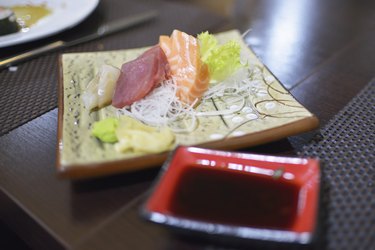
Gastritis refers to a variety of conditions that cause inflammation of the stomach lining. While some cases of gastritis can be indicative of more serious conditions -- such as stomach cancer -- others may result in milder symptoms of pain or stomach discomfort. Since rice vinegar contains a high level of acidity, it may have a worsening effect on your inflammation symptoms. For best results, stick to small portions of fresh, raw sushi seasoned with soy sauce or other vinegar substitutes.
Definition
Video of the Day
Gastritis is generally diagnosed as one of two basic types: chronic and acute. Unlike the chronic variety, acute gastritis tends to appear suddenly and with little warning. Along with stomach ulcers and cancer, gastritis can be caused by a variety of factors including injury, bacterial infection, stress, bile reflux disease, parasitic infections, Crohn's disease, HIV, and excessive alcohol or pain reliever consumption. While the term gastritis can be used to describe a group of conditions, each specific condition has one thing in common: inflammation of the stomach lining.
Video of the Day
Sushi and Gastritis
Since most gastritis patients are advised to eat smaller portions during meals, sushi seems like an ideal food choice. Unlike large-portion meals, smaller meals, such as sushi, require less stomach acid in order to be fully digested. Unfortunately, some sushi rolls can be more problematic than others. For example, rolls that use spices, such as wasabi or spicy mayonnaise, may worsen your symptoms of inflammation, while deep--fried, or tempura rolls, can lead to upset stomach or indigestion. Added seasonings, such as chili sauce, may also irritate the lining of your stomach. In order to limit the negative impacts of your sushi dish, select a roll that contains fresh seafood and vegetables without any spicy seasonings.
Rice Vinegar
According to the Vinegar Institute website, all vinegar products sold in the United States are required by the FDA to have an acidity level of 4 percent or higher. This means that most types of rice vinegar used for sushi seasoning contain a relatively high level of acetic acid compared to other seasoning types. While white distilled vinegar tends to have an acidity level between 4 and 7 percent, wine, rice and cider vinegars may have a 5 percent or higher percentage of acidity. This means that most vinegar products are off limits for patients seeking to manage their gastritis symptoms.
Safety Concerns
In general, it is best to avoid any food that will cause your stomach to produce excess gastric acid. According to Drugs.com, this includes peppers, chilies, caffeine, teas, cola, tomatoes, peppermint, citrus, onions, garlic, cinnamon and cloves. Due to its high content of acetic acid, vinegar should be avoided in favor of soy sauce or other seasonings that have less of an impact on your gastritis. If you haven't already, talk to your doctor about your condition to try and determine the exact causes of your gastritis.